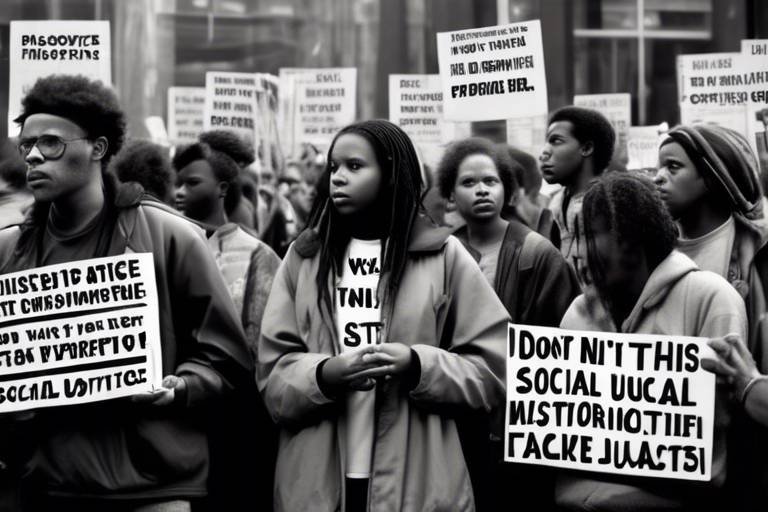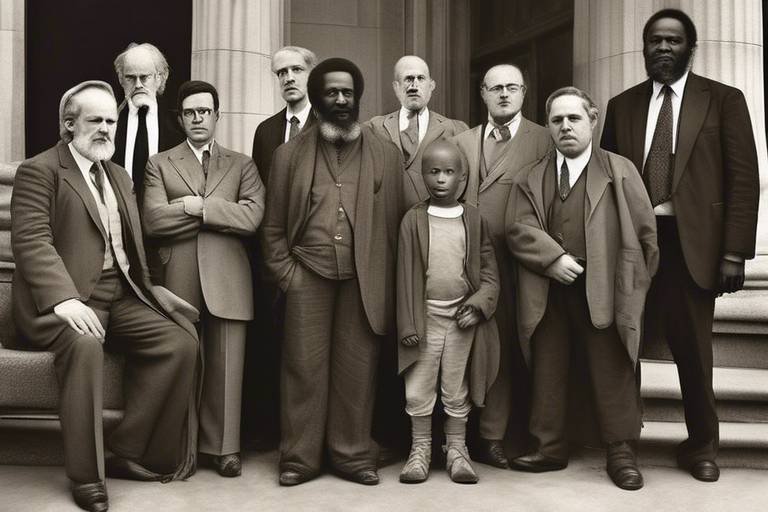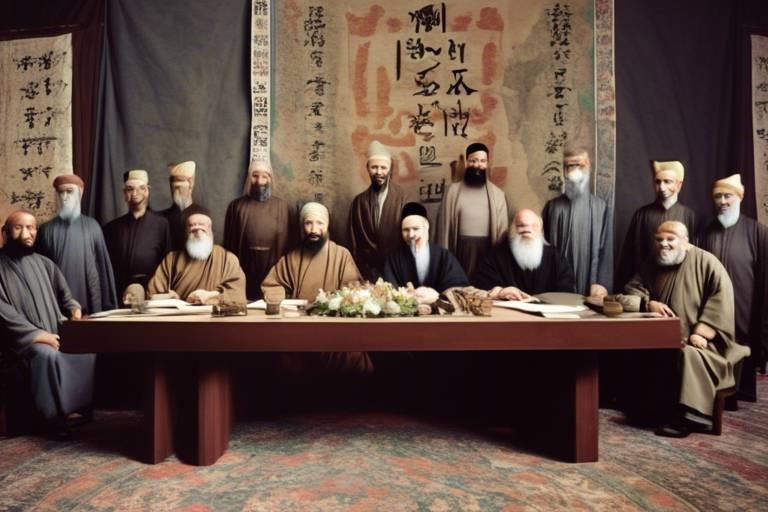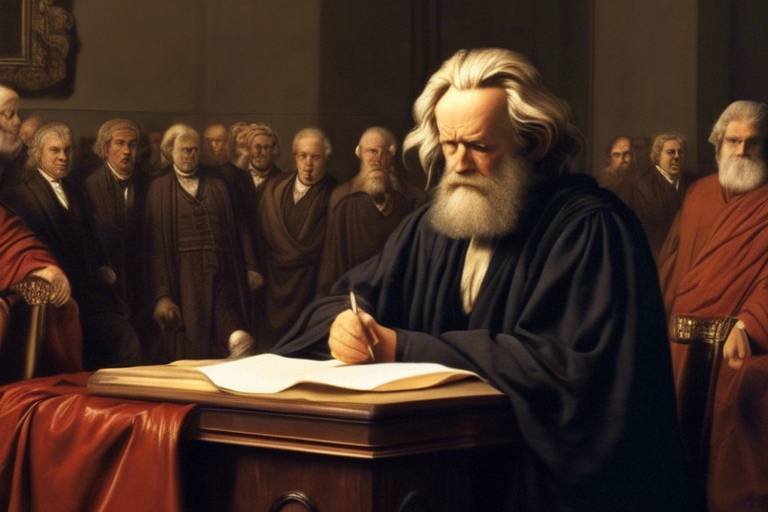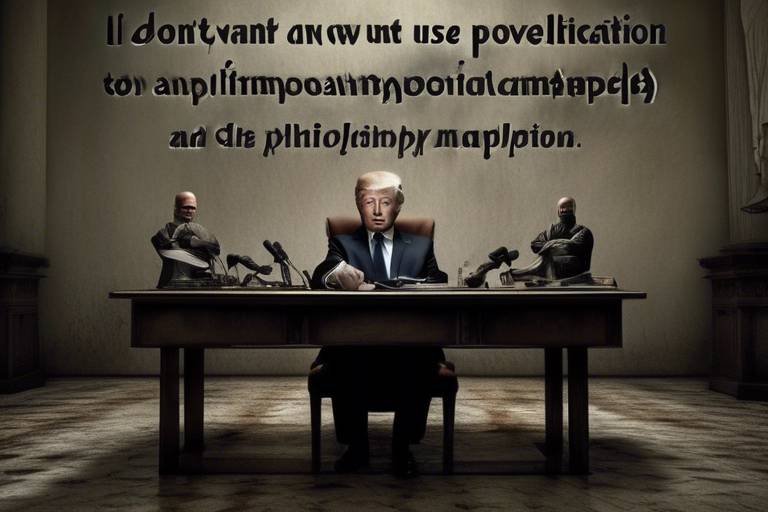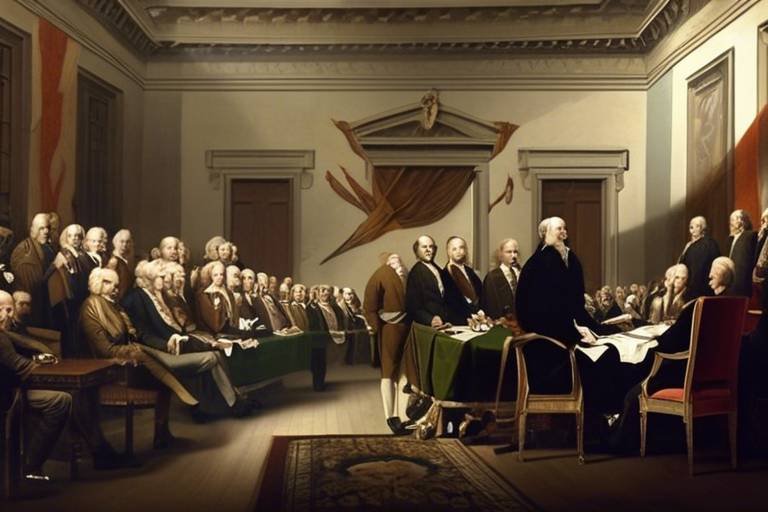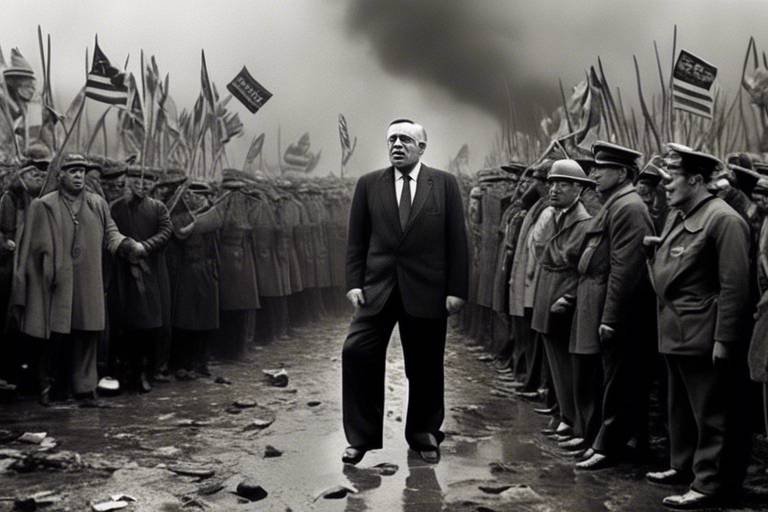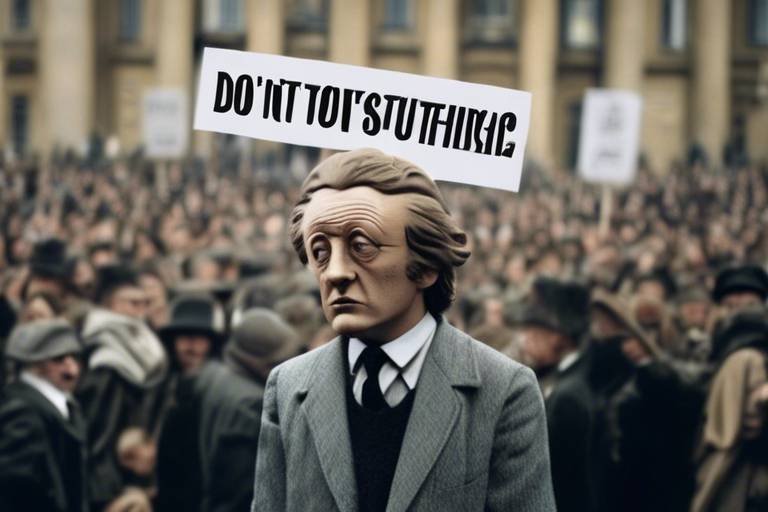Philosophy's Influence on Political Human Rights Policies
In the ever-evolving landscape of **human rights**, the **philosophical underpinnings** that shape political frameworks are both profound and intricate. From the ancient teachings of Greek philosophers to the revolutionary ideas of the Enlightenment, philosophy has been the bedrock upon which modern human rights policies are constructed. Imagine philosophy as the architect, meticulously designing the blueprint for a society that values dignity, freedom, and justice. This article delves into the historical contexts and key philosophical movements that have not only influenced but also transformed our understanding of human rights in contemporary politics.
The journey begins with the **historical foundations of human rights**, which are crucial for grasping how philosophical ideas have developed over centuries. Ancient Greece introduced concepts of citizenship and civic duty, while the Enlightenment era brought forth radical ideas about individual liberty and equality. These philosophical movements laid the groundwork for modern human rights concepts, enabling societies to establish political systems that prioritize the well-being of individuals. Thus, understanding this historical trajectory is akin to tracing the roots of a great tree, where each branch represents a significant philosophical contribution to the discourse on human rights.
As we explore the historical foundations, we find that the evolution of human rights is not merely a linear progression; it is a rich tapestry woven from various philosophical threads. The **Enlightenment thinkers**, such as **John Locke** and **Jean-Jacques Rousseau**, played pivotal roles in articulating ideas that would shape human rights discourse. Locke's assertion that individuals possess natural rights to life, liberty, and property resonated through the ages, influencing political documents like the **United States Declaration of Independence**. Rousseau's concept of the social contract emphasized the collective responsibility of society to uphold individual rights, a principle that continues to inform democratic governance today.
Delving deeper into the key philosophical movements, we encounter **liberalism**, **utilitarianism**, and **existentialism**, each contributing uniquely to the dialogue surrounding human rights. Liberalism champions individual freedoms and the protection of rights against state infringement, while utilitarianism, as advocated by thinkers like **Jeremy Bentham** and **John Stuart Mill**, offers a consequentialist approach. This perspective seeks to maximize overall happiness, often leading to policies aimed at achieving the greatest good for the greatest number. However, this raises critical questions: Does the pursuit of the majority's happiness justify the infringement of minority rights? Such inquiries are essential as they highlight the complexities of translating philosophical ideals into practical policies.
During the Enlightenment, the emphasis on **rationality** and **social contracts** became central to the discourse on human rights. Philosophers like **Immanuel Kant** posited that human beings are inherently rational and deserve respect and dignity. This respect for individuals as ends in themselves laid the groundwork for the recognition of universal human rights. The Enlightenment's legacy is evident in contemporary human rights documents, which echo the call for equality and justice, urging societies to recognize the intrinsic worth of every individual.
Locke's contributions to human rights cannot be overstated. His assertion that government should be based on the consent of the governed and that it exists to protect natural rights has become a cornerstone of modern democratic thought. Locke's emphasis on **life**, **liberty**, and **property** as fundamental rights created a framework that advocates for the protection of individual freedoms against tyranny. This philosophy not only influenced the formation of constitutions but also sparked revolutions that sought to liberate individuals from oppressive regimes.
Rousseau's idea of the social contract further enriched the philosophical discourse on human rights. He argued that individuals enter into a collective agreement to form a society that protects their rights. This concept underscores the idea that while individuals have rights, they also have responsibilities towards one another. Rousseau's insights have shaped democratic principles, emphasizing the need for political systems that prioritize human dignity and collective well-being.
Utilitarianism introduces a different lens through which to view human rights. By focusing on outcomes, this philosophical approach challenges policymakers to consider the broader implications of their decisions. While it promotes the idea of maximizing happiness, it can inadvertently lead to the neglect of minority rights in favor of the majority's welfare. This tension between collective good and individual rights remains a significant challenge in contemporary human rights discourse.
As we navigate the complexities of contemporary human rights debates, the dichotomy between **universalism** and **relativism** emerges as a critical theme. Are human rights inherent to all individuals, or are they culturally specific? This question challenges policymakers to reconcile differing cultural perspectives with the aspiration for universal rights. The ongoing discourse emphasizes the need for a nuanced understanding of human rights that respects cultural diversity while advocating for fundamental freedoms.
The tension between universal human rights and cultural relativism raises essential questions about the applicability of rights across different societies. Advocates of universalism argue that certain rights are inalienable, while relativists contend that rights must be understood within their cultural contexts. This philosophical debate is vital for shaping policies that are both respectful and effective in promoting human rights globally.
Postcolonial philosophers add another layer to the discussion by advocating for a re-examination of human rights frameworks. They argue that historical injustices and cultural contexts must be considered when developing human rights policies. This perspective encourages a more inclusive approach that recognizes the diverse experiences of individuals across the globe, ultimately aiming for a more equitable political landscape.
Finally, international law plays a pivotal role in codifying human rights principles, heavily influenced by philosophical ideas. Treaties and conventions, such as the **Universal Declaration of Human Rights**, reflect the philosophical underpinnings that inform their development. By understanding the philosophical context of these legal frameworks, we can better appreciate their significance in promoting and protecting human rights on a global scale.
- What is the relationship between philosophy and human rights? Philosophy provides the foundational ideas and principles that shape our understanding of human rights, influencing political frameworks and policies.
- How do historical contexts influence human rights? Historical contexts shape the development of human rights concepts, with various philosophical movements contributing to their evolution over time.
- What are the main philosophical movements that influence human rights? Key movements include liberalism, utilitarianism, and existentialism, each offering unique perspectives on individual rights and societal responsibilities.
- How do contemporary debates impact human rights policies? Ongoing debates, such as universalism versus relativism, challenge policymakers to create inclusive frameworks that respect cultural diversity while promoting fundamental freedoms.

Historical Foundations of Human Rights
Understanding the historical development of human rights is crucial, as philosophical ideas from ancient Greece to the Enlightenment laid the groundwork for modern human rights concepts and their political implementations. The journey of human rights has been a long and complex one, marked by significant philosophical milestones that have shaped our understanding of what it means to be human and what rights we inherently possess. From the early thinkers who pondered the nature of justice and morality to the revolutionary ideas that sparked political upheaval, the evolution of human rights is deeply intertwined with the evolution of philosophical thought.
In ancient Greece, philosophers like Socrates and Plato began to explore the nature of justice and the role of the individual within society. Their discussions laid the groundwork for later thinkers who would advocate for the rights of individuals. Fast forward to the Renaissance and the Enlightenment, and we see a dramatic shift in thought. The emphasis on reason, individualism, and the social contract became central to the discourse on human rights. Thinkers such as John Locke and Jean-Jacques Rousseau argued that individuals possess inherent rights that must be recognized and protected by the state.
Locke’s philosophy, particularly his ideas on natural rights, emphasized that every person is entitled to life, liberty, and property. This notion was revolutionary and became a cornerstone for modern democratic societies. Locke argued that the legitimacy of government is derived from the consent of the governed, a concept that would later inspire revolutions and the formation of constitutional democracies around the world. In contrast, Rousseau introduced the idea of the social contract, suggesting that individuals must collectively agree to form a society that respects and upholds their rights. This idea not only influenced political systems but also highlighted the importance of community and mutual responsibility in safeguarding human dignity.
The Enlightenment era also saw the emergence of ideas that challenged the status quo. Philosophers began to question traditional authority and advocate for the rights of marginalized groups. This period was characterized by a growing recognition that human rights should extend beyond the privileged few to encompass all individuals, regardless of their social standing. The American Revolution and the French Revolution were pivotal moments that reflected these philosophical shifts, as they sought to establish governments that were accountable to the people and committed to protecting individual rights.
As we move into the modern era, the historical foundations of human rights continue to resonate. The aftermath of the World Wars and the atrocities committed during these conflicts led to a renewed commitment to human rights on a global scale. The establishment of the United Nations and the adoption of the Universal Declaration of Human Rights in 1948 marked a significant milestone in the recognition of human rights as a fundamental aspect of international law. This document, influenced by centuries of philosophical thought, serves as a guiding framework for nations striving to uphold the dignity and rights of every individual.
In summary, the historical foundations of human rights are deeply rooted in philosophical inquiry and debate. From the ancient Greeks to modern thinkers, each contribution has shaped our understanding of rights and the responsibilities of governments. As we continue to navigate the complexities of contemporary human rights issues, it is essential to reflect on this rich history and the philosophical underpinnings that continue to inform our policies and practices today.
- What are human rights? Human rights are the basic rights and freedoms that belong to every person in the world, from birth until death.
- Why are philosophical foundations important for human rights? Philosophical foundations provide the ethical framework that underpins the concept of human rights, guiding how they are understood and implemented.
- How did the Enlightenment influence modern human rights? The Enlightenment introduced ideas of individual liberty and equality, which significantly shaped the development of human rights concepts.
- What role does international law play in human rights? International law codifies human rights principles and provides a framework for their protection and enforcement globally.
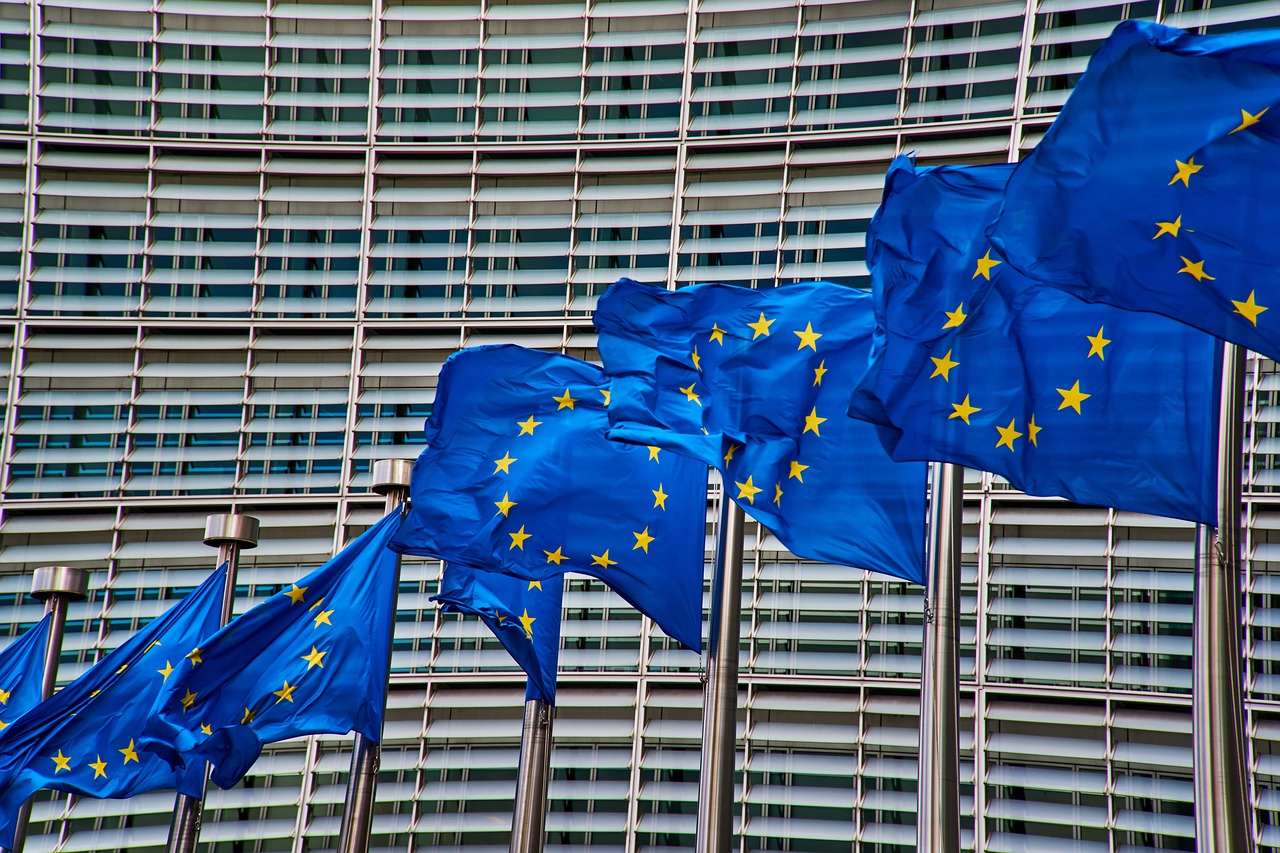
Key Philosophical Movements
Throughout history, various philosophical movements have played a pivotal role in shaping the discourse surrounding human rights. These ideologies have not only influenced how we understand individual rights but also how societies implement policies to protect them. From the liberalism of the Enlightenment to the utilitarianism that emerged in the 19th century, each movement has contributed unique perspectives that continue to resonate in contemporary discussions about human rights.
One cannot overlook the impact of liberalism, which emerged as a response to authoritarianism and social injustice. This movement champions the idea of individual freedom and the protection of personal rights. Think of liberalism as the sturdy foundation of a house; without it, the structure of human rights would lack stability and coherence. Philosophers like John Locke and Jean-Jacques Rousseau were instrumental in advocating for the rights of individuals, arguing that every person is entitled to life, liberty, and property. Their ideas laid the groundwork for modern democratic principles, emphasizing that governments derive their authority from the consent of the governed.
In contrast, utilitarianism offers a different lens through which to view human rights. This consequentialist philosophy, articulated by thinkers such as Jeremy Bentham and John Stuart Mill, posits that the best action is the one that maximizes overall happiness. Imagine a scale where the well-being of the majority is weighed against the rights of the few; utilitarianism seeks to tip that scale in favor of the greatest good for the greatest number. While this approach has its merits, it raises questions about the potential sacrifice of individual rights for collective welfare. How do we ensure that the rights of minorities are not trampled in the pursuit of societal happiness?
Another significant movement is existentialism, which emphasizes individual experience and personal responsibility. Existentialist philosophers like Sartre and Camus argue that humans must create their own meaning and values in a world that often appears indifferent. This perspective challenges us to consider how personal freedom and authenticity intersect with the broader framework of human rights. In a way, existentialism is like a compass, guiding individuals to navigate the often murky waters of moral and ethical dilemmas in the context of rights.
The interplay between these philosophical movements creates a rich tapestry of thought that informs contemporary human rights policies. The implications are profound: as societies grapple with issues ranging from freedom of speech to social justice, the philosophical underpinnings of these movements continue to shape our understanding of what it means to be human. The debates are ongoing, and the challenge lies in integrating these diverse perspectives into coherent policies that respect and uphold human dignity.
To further explore the connections between these movements and human rights, consider the following table summarizing key philosophical contributions:
| Philosophical Movement | Key Contributors | Main Ideas |
|---|---|---|
| Liberalism | John Locke, Jean-Jacques Rousseau | Individual rights, consent of the governed |
| Utilitarianism | Jeremy Bentham, John Stuart Mill | Greatest good for the greatest number |
| Existentialism | Sartre, Camus | Personal freedom, individual responsibility |
In conclusion, the philosophical movements that have shaped human rights discourse are not merely academic; they have real-world implications that affect policies and practices globally. As we continue to engage with these ideas, it becomes increasingly important to reflect on how they influence our understanding of justice, equality, and the inherent dignity of every individual.
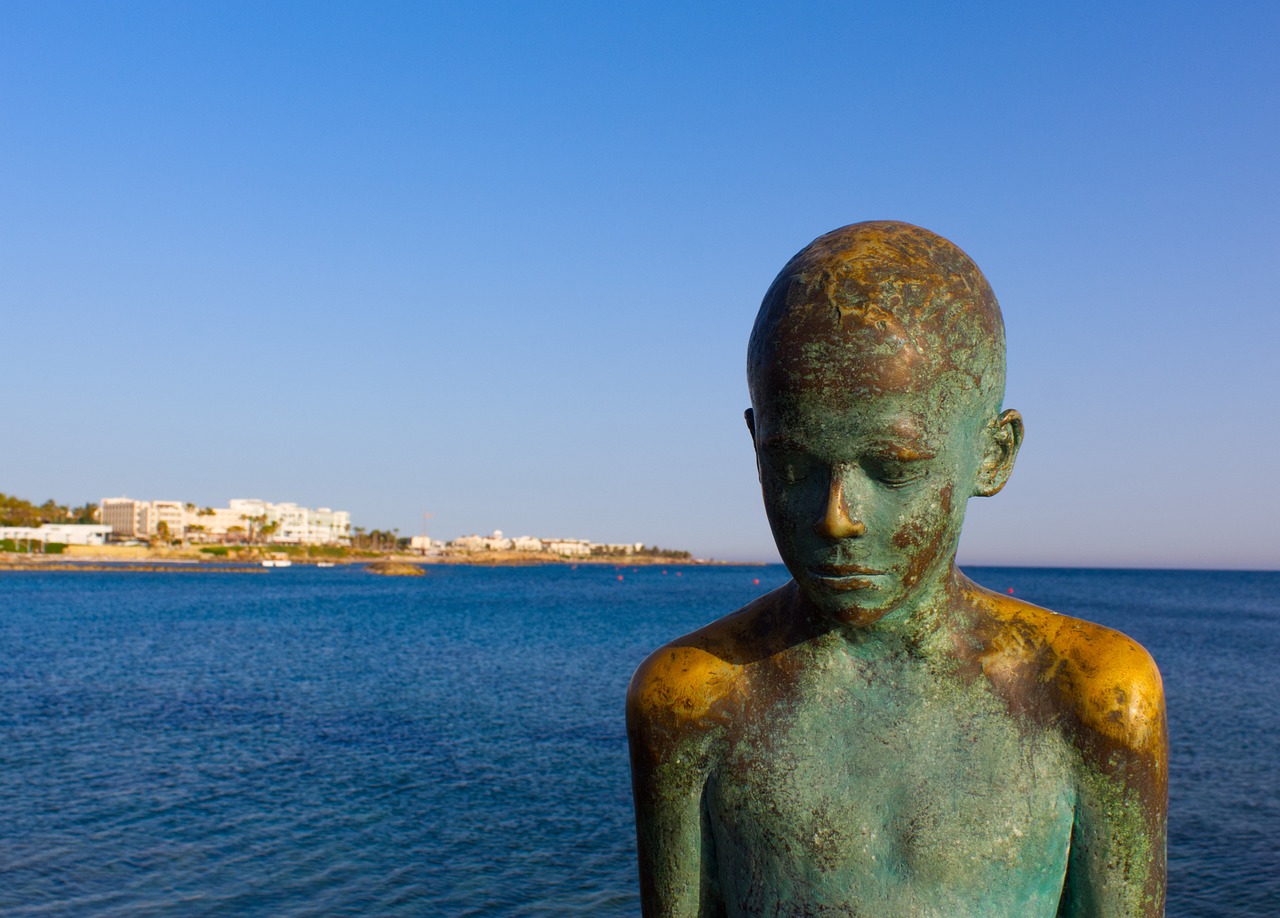
Enlightenment Thought
The Enlightenment era was a remarkable period that transformed the landscape of political thought and human rights. It was a time when ideas flowed like a river, shaping the very foundations of modern societies. Philosophers such as Immanuel Kant and Jean-Jacques Rousseau emerged as titans of thought, advocating for principles that would resonate through the ages. Their emphasis on individual liberty and equality laid the groundwork for the political human rights we cherish today. But what exactly did they propose that was so revolutionary?
At the heart of Enlightenment thought was the idea that individuals possess inherent rights simply by virtue of being human. This was a significant departure from previous notions that rights were granted by monarchs or religious authorities. Kant, for instance, argued that rationality was the cornerstone of human dignity and that every person should be treated as an end in themselves, not merely as a means to an end. This philosophical shift challenged the status quo and paved the way for the recognition of universal human rights.
Rousseau, on the other hand, introduced the concept of the social contract. He posited that individuals willingly enter into a collective agreement to form a society that respects and protects their rights. This idea emphasized the responsibility of the community to uphold individual rights, which was a radical notion at the time. Rousseau's vision of governance suggested that political authority should derive from the consent of the governed, a principle that has become a cornerstone of modern democratic systems.
To illustrate the impact of Enlightenment thought, consider the following key ideas:
- Rationalism: The belief that reason is the primary source of authority and legitimacy.
- Individualism: The idea that individual rights and freedoms are paramount.
- Equality: The assertion that all individuals are equal in their rights and dignity.
These principles not only influenced the political frameworks of their time but also had far-reaching implications for contemporary human rights practices. The Enlightenment thinkers sparked a fire of change that would eventually lead to revolutions and the establishment of democratic societies where human rights are enshrined in law.
In summary, the Enlightenment was more than just an intellectual movement; it was a catalyst for change that fundamentally altered how we perceive rights and governance. The ideas of Kant and Rousseau continue to inspire debates about the nature of rights, the role of government, and the responsibilities of individuals within society. As we navigate the complexities of modern human rights discussions, it is essential to remember the profound influence of Enlightenment thought and its enduring legacy.

John Locke's Contributions
John Locke, a pivotal figure in the realm of political philosophy, profoundly influenced the development of modern human rights through his groundbreaking theories. His ideas laid the groundwork for understanding the concept of natural rights, which he believed were inherent to every individual. Locke argued that these rights—primarily life, liberty, and property—were not granted by governments but were instead fundamental entitlements that existed prior to any political authority. This notion was revolutionary at the time and challenged the prevailing views of absolute monarchy and divine right.
Locke's belief in the social contract was another cornerstone of his philosophy. He posited that individuals consent to form governments to protect their natural rights. This idea of government by consent was radical, suggesting that the legitimacy of political power is derived from the will of the governed rather than through coercion or inheritance. Essentially, Locke argued that if a government fails to protect these rights, the people have the right to revolt and establish a new government that would uphold their freedoms. This principle not only inspired future democratic movements but also shaped the political landscape by emphasizing the importance of individual agency in governance.
Furthermore, Locke's thoughts on property rights were particularly significant. He contended that property was an extension of one's labor and effort. When individuals work to cultivate resources, they have a natural right to claim ownership of those resources. This idea laid the foundation for capitalist economies and the protection of property rights as a fundamental aspect of human rights. In Locke's view, the protection of property was essential for the preservation of personal freedom, as it allowed individuals to thrive and pursue their own happiness.
Locke's contributions can be summarized in the following key points:
- Natural Rights: Life, liberty, and property as fundamental entitlements.
- Social Contract: Government's legitimacy comes from the consent of the governed.
- Right to Revolt: Citizens can overthrow a government that fails to protect their rights.
- Property Rights: Ownership as an extension of labor and effort.
In conclusion, John Locke's philosophical contributions have had a lasting impact on the discourse surrounding human rights and political theory. His ideas not only shaped Enlightenment thought but also laid the groundwork for modern democratic principles. The emphasis on individual rights and the role of government in protecting these rights continues to resonate in contemporary human rights policies, making Locke a crucial figure in understanding the evolution of political thought.
- What are John Locke's main contributions to political philosophy?
Locke's main contributions include the concepts of natural rights, the social contract, and the right to revolt against unjust governments. - How did Locke influence modern democracy?
His ideas about government by consent and individual rights have been foundational in shaping democratic principles and practices. - Why are Locke's theories on property rights significant?
Locke's theories emphasize that property is a natural extension of one's labor, influencing economic systems and the protection of property rights as human rights.

Rousseau's Social Contract
Jean-Jacques Rousseau's concept of the social contract is a pivotal idea in the realm of political philosophy, fundamentally reshaping our understanding of individual rights and collective responsibility. According to Rousseau, individuals come together to form a community, relinquishing certain freedoms in exchange for the protection of their remaining rights. This mutual agreement is not merely a legal formality; it is a moral foundation that binds society together. In his seminal work, The Social Contract, Rousseau famously states, “Man is born free, and everywhere he is in chains.” This profound assertion highlights the tension between individual liberty and societal constraints, suggesting that while individuals are inherently free, societal structures often impose limitations on that freedom.
Rousseau argues that the legitimacy of political authority stems from the consent of the governed, emphasizing that a government must reflect the general will of the people. This idea is significant because it shifts the focus from the ruler’s power to the rights of individuals within the society. The social contract, therefore, establishes a framework where the government is accountable to the people, ensuring that their rights are not only recognized but actively protected. Rousseau's vision of the social contract has profound implications for modern democratic systems, advocating for a political structure that prioritizes the dignity and autonomy of every individual.
Moreover, Rousseau’s social contract introduces the notion of collective responsibility. He posits that individuals have a duty to uphold the rights of others, fostering a sense of community and solidarity. This collective approach is essential in creating a society where human rights are not just individual privileges but shared commitments. In this context, the government serves as a facilitator of these rights, ensuring that they are respected and maintained across the board. As Rousseau articulates, a society that fails to protect the rights of its members undermines its own legitimacy.
In summary, Rousseau's social contract emphasizes the interplay between individual rights and societal obligations, advocating for a political system that is both just and equitable. His ideas continue to resonate in contemporary discussions about democracy and human rights, reminding us that the health of a society relies on its ability to balance personal freedoms with collective welfare. As we navigate the complexities of modern governance, Rousseau's insights encourage us to reflect on the fundamental question: how can we create a society that honors both individual rights and the common good?
- What is the social contract theory?
The social contract theory posits that individuals consent to form a society and establish a government to protect their rights and maintain social order. - How does Rousseau's social contract differ from other social contract theories?
Unlike Hobbes and Locke, Rousseau emphasizes the importance of the collective will and the moral obligations individuals have toward one another within a society. - What impact did Rousseau's ideas have on modern democracy?
Rousseau's emphasis on the general will and the accountability of government to the people has significantly influenced democratic principles and practices.

Utilitarian Perspectives
Utilitarianism, a philosophical doctrine primarily associated with thinkers like Jeremy Bentham and John Stuart Mill, has significantly shaped the landscape of human rights discourse. At its core, utilitarianism promotes the idea that the best action is the one that maximizes overall happiness or utility. This consequentialist approach has profound implications for the formulation of political human rights policies, as it encourages policymakers to consider the outcomes of their decisions on the greatest number of people.
One of the key tenets of utilitarianism is the principle of the "greatest good for the greatest number." This principle leads to a focus on collective well-being rather than individual rights. For instance, when drafting human rights policies, a utilitarian perspective might prioritize actions that benefit the majority, even if they come at the expense of certain individual rights. This raises critical questions about the balance between collective welfare and personal freedoms. Are we willing to sacrifice the rights of a few to ensure the happiness of many? This dilemma is at the heart of utilitarian thought and has sparked extensive debate among philosophers and policymakers alike.
Utilitarianism also emphasizes the importance of measurable outcomes. In the context of human rights, this means that policies should be evaluated based on their effectiveness in promoting overall well-being. For example, a government might implement a policy aimed at reducing poverty, measuring its success not just by the number of people lifted out of poverty but also by the overall happiness and quality of life improvements experienced by the population. This pragmatic approach can lead to innovative solutions but also risks oversimplifying complex human experiences into mere metrics.
Moreover, utilitarianism has been critiqued for its potential to justify human rights violations. If the happiness of the majority is prioritized, there is a risk that minority groups may be marginalized or oppressed in the name of the greater good. This tension highlights the need for a careful balance between utilitarian principles and the protection of individual rights. Acknowledging this challenge, some modern utilitarian thinkers advocate for a more nuanced approach that incorporates respect for individual rights as a component of overall utility.
In summary, utilitarian perspectives on human rights emphasize the importance of outcomes and collective well-being, but they also present significant ethical dilemmas. As we navigate the complexities of human rights policy, it is crucial to engage with these philosophical ideas critically, ensuring that the pursuit of the greatest good does not come at the cost of fundamental human dignity.
- What is utilitarianism? Utilitarianism is a philosophical theory that suggests the best action is the one that maximizes overall happiness or utility.
- How does utilitarianism influence human rights policies? It encourages policymakers to focus on the outcomes of their decisions, often prioritizing the greatest good for the greatest number.
- What are the criticisms of utilitarianism in the context of human rights? Critics argue that it can lead to the justification of rights violations if the happiness of the majority is prioritized over the rights of the minority.
- Can utilitarianism and individual rights coexist? Some modern utilitarian thinkers advocate for a balance, suggesting that respect for individual rights can be integral to overall utility.
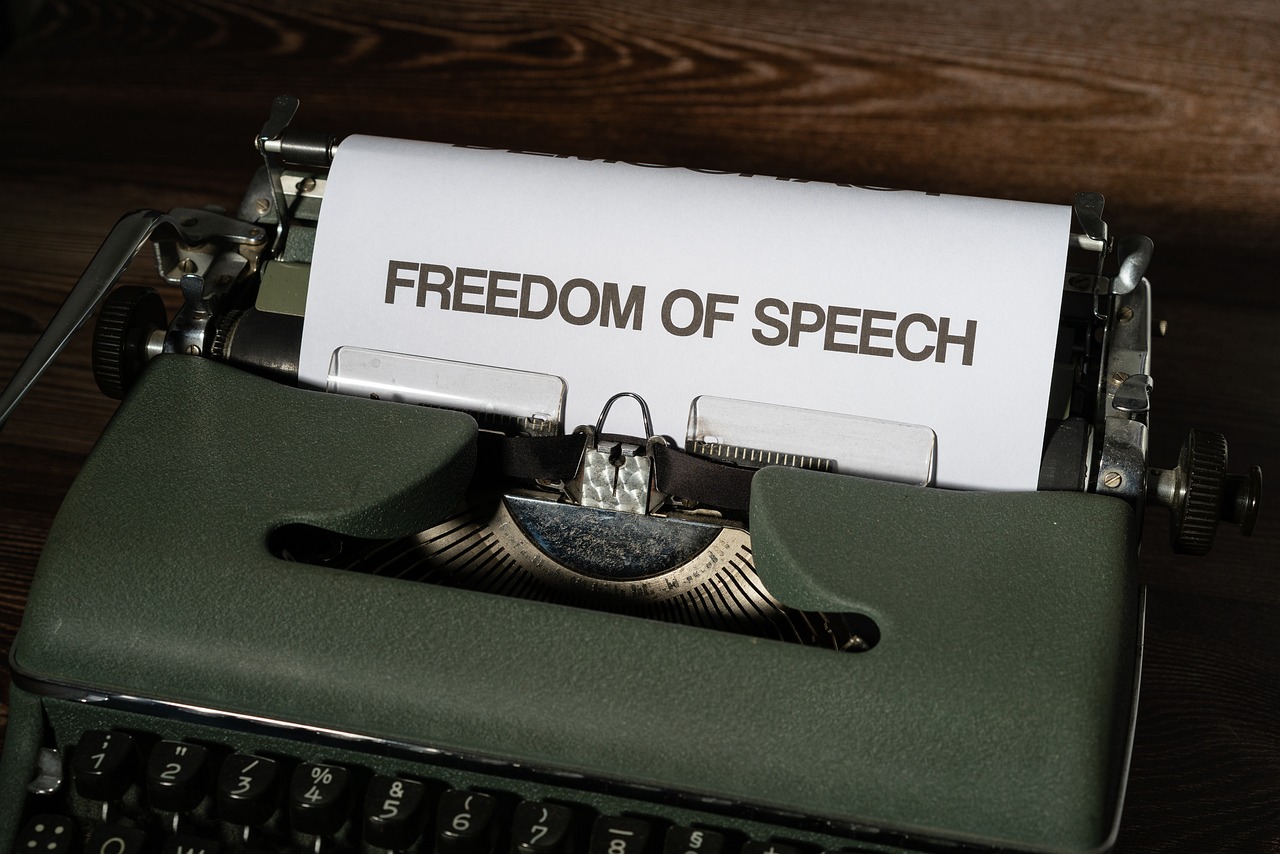
Contemporary Philosophical Debates
In today's world, the discourse surrounding human rights is more vibrant and contentious than ever. Philosophical debates that have emerged in recent decades focus on the tension between universalism and cultural relativism. This fundamental question asks whether human rights are inherent to all individuals, regardless of their cultural context, or if they are shaped by specific cultural norms and practices. This debate is not just academic; it has real-world implications for how policies are crafted and implemented globally.
At the heart of the universalism versus relativism debate lies the idea that human rights should apply to everyone, everywhere. Proponents of universalism argue that certain rights, such as the right to life, freedom from torture, and freedom of expression, are inalienable and should be recognized regardless of cultural differences. They often cite documents like the Universal Declaration of Human Rights (UDHR) as evidence that a global consensus exists on basic human rights. This perspective is rooted in the belief that all humans share a common dignity that transcends cultural boundaries.
Conversely, cultural relativists challenge this notion, asserting that human rights cannot be universally applied without considering the unique historical and cultural contexts of different societies. They argue that what is considered a right in one culture may not hold the same significance in another. For example, the right to free speech might clash with cultural norms that prioritize community harmony over individual expression. This perspective raises critical questions, such as: Are we imposing Western values on non-Western societies? and How do we respect cultural diversity while advocating for universal rights?
Furthermore, the debate extends into the realm of postcolonial philosophy, which critiques the historical imposition of human rights frameworks by colonial powers. Postcolonial thinkers argue for a re-examination of human rights that acknowledges past injustices and considers the voices of those from historically marginalized communities. They advocate for a more inclusive approach that reflects the diverse experiences and needs of all individuals, rather than a one-size-fits-all solution. This perspective not only enriches the human rights discourse but also challenges policymakers to think critically about whose voices are being heard in the formation of rights-based policies.
As we navigate these contemporary philosophical debates, it becomes evident that the implications for global human rights policies are profound. Policymakers are tasked with striking a balance between upholding universal principles while being sensitive to cultural contexts. This requires an ongoing dialogue that includes diverse perspectives and acknowledges the complexities of human rights in a globalized world.
- What is the difference between universalism and cultural relativism?
Universalism advocates for the application of human rights to all individuals, while cultural relativism suggests that rights must be interpreted within the context of specific cultures. - How do postcolonial perspectives influence human rights?
Postcolonial perspectives encourage a re-evaluation of human rights frameworks to include the histories and experiences of marginalized groups, promoting a more inclusive approach. - Why is the debate on human rights relevant today?
This debate is crucial as it shapes policies that affect millions of lives globally, influencing how rights are recognized and protected across different societies.

Universalism vs. Relativism
The debate between universalism and relativism in the realm of human rights is one of the most compelling discussions in contemporary philosophy. At its core, universalism posits that human rights are inherent to all individuals, regardless of cultural, social, or political context. This perspective argues that rights such as freedom, equality, and dignity should be recognized universally, transcending geographical and cultural boundaries. Think of it like a global passport; it grants everyone access to the same rights, no matter where they are from.
On the other hand, relativism challenges this notion by asserting that human rights are culturally specific and cannot be universally applied. This viewpoint suggests that the interpretation and implementation of rights must be sensitive to cultural contexts and historical backgrounds. For instance, what may be considered a fundamental right in one society could be viewed differently in another. It's akin to trying to fit a square peg into a round hole; forcing a universal standard can lead to misunderstandings and conflicts.
This tension between universalism and relativism raises critical questions for policymakers. How can they navigate the complexities of implementing human rights in diverse cultural landscapes? Is it possible to uphold universal standards while respecting local customs and traditions? These questions are not just academic; they have real-world implications. For example, in some cultures, practices that are deemed violations of human rights in the West may be considered acceptable or even sacred. This discrepancy can lead to significant friction in international relations and humanitarian efforts.
Moreover, the debate is further complicated by the influence of globalization. As cultures interact and blend, the lines between universal and culturally specific rights become increasingly blurred. This creates a unique opportunity for dialogue and mutual understanding, but it also poses challenges in maintaining respect for cultural diversity while advocating for universal human rights. In this evolving landscape, it is essential for international bodies, governments, and NGOs to foster discussions that appreciate both perspectives.
In conclusion, the universalism-versus-relativism debate is not just a theoretical exercise; it is a crucial consideration for the future of human rights policies worldwide. Striking a balance between these two viewpoints can lead to more inclusive and effective human rights frameworks that respect cultural differences while promoting fundamental freedoms. As we move forward, the challenge will be to create a dialogue that honors both the universality of human rights and the richness of cultural diversity.
- What is universalism in human rights? Universalism is the belief that human rights are inherent to all individuals, regardless of cultural or social differences.
- What does relativism mean in the context of human rights? Relativism suggests that human rights are culturally specific and should be interpreted within their cultural context.
- Why is the universalism vs. relativism debate important? This debate is crucial because it influences how human rights are understood, implemented, and respected across different cultures and societies.
- Can universal human rights coexist with cultural practices? Yes, it is possible to find a balance where universal human rights are upheld while respecting cultural practices, although this requires careful negotiation and dialogue.

Postcolonial Perspectives
Postcolonial philosophy emerges as a critical lens through which we can examine the complexities of human rights in a world shaped by colonial histories. These perspectives challenge the dominant narratives that often frame human rights as universal and inherently applicable to all cultures. Instead, they argue for a more nuanced understanding that recognizes the historical injustices and power dynamics that have influenced the development of human rights frameworks. For instance, the legacy of colonialism has left deep scars on societies, and these scars cannot be overlooked when discussing the rights and dignity of individuals within those societies.
One of the central tenets of postcolonial thought is the idea that human rights must be contextualized within specific cultural and historical frameworks. This approach highlights the importance of acknowledging local customs, traditions, and values when formulating human rights policies. For example, what is considered a fundamental right in one culture may not hold the same significance in another due to differing historical experiences and societal structures. Therefore, a one-size-fits-all approach to human rights can be not only ineffective but also disrespectful.
Moreover, postcolonial theorists emphasize the need for inclusivity in the discourse surrounding human rights. They argue that marginalized voices, particularly those from formerly colonized nations, must be included in the conversations that shape human rights policies. This inclusion is vital for creating frameworks that genuinely reflect the needs and aspirations of diverse populations. To illustrate this point, consider the following key aspects of postcolonial perspectives on human rights:
- Historical Context: Understanding the impact of colonialism on contemporary societies is essential for developing relevant human rights policies.
- Cultural Sensitivity: Recognizing and respecting local customs and traditions can lead to more effective and accepted human rights practices.
- Inclusivity: Engaging marginalized voices in the human rights discourse ensures that policies are representative and equitable.
In conclusion, postcolonial perspectives urge us to rethink our approach to human rights. By blending philosophical inquiry with an understanding of historical injustices, we can pave the way for more inclusive and culturally sensitive human rights policies. This shift not only honors the dignity of individuals across various cultures but also enriches the global dialogue surrounding human rights, making it more relevant and impactful.
Q1: What are postcolonial perspectives on human rights?
A1: Postcolonial perspectives on human rights emphasize the need to contextualize rights within specific cultural and historical frameworks, acknowledging the impact of colonialism and advocating for inclusivity in human rights discourse.
Q2: Why is cultural sensitivity important in human rights?
A2: Cultural sensitivity is crucial because it ensures that human rights policies respect local customs and traditions, making them more effective and accepted by the communities they aim to serve.
Q3: How can marginalized voices be included in human rights discussions?
A3: Including marginalized voices can be achieved by actively engaging with communities, listening to their experiences, and ensuring their perspectives are represented in policy-making processes.

The Role of International Law
International law serves as a cornerstone in the establishment and enforcement of human rights principles across the globe. It provides a framework within which nations can articulate their commitments to uphold the dignity and rights of individuals, transcending national boundaries. The influence of philosophical thought is evident in the creation of various international treaties and conventions designed to protect human rights. For instance, the Universal Declaration of Human Rights (UDHR), adopted by the United Nations in 1948, embodies Enlightenment ideals of liberty, equality, and fraternity, reflecting the philosophical underpinnings that advocate for the inherent rights of all human beings.
Moreover, international law not only codifies these rights but also creates mechanisms for accountability. Treaties such as the International Covenant on Civil and Political Rights (ICCPR) and the Convention on the Rights of the Child (CRC) provide legal frameworks that obligate states to respect, protect, and fulfill the rights enshrined within them. This legal obligation is crucial because it shifts the responsibility of protecting human rights from mere ethical considerations to enforceable legal standards. As such, countries that ratify these treaties are held accountable under international law, which can lead to sanctions or interventions if they fail to comply.
In addition to these treaties, international law also encompasses various judicial bodies, such as the International Criminal Court (ICC) and regional human rights courts, which play a significant role in adjudicating human rights violations. These institutions are vital for providing justice and reparations to victims, thus reinforcing the notion that human rights are not just theoretical constructs but practical realities that require enforcement. The philosophical debates surrounding human rights, particularly the tension between universalism and relativism, are also reflected in the workings of these institutions, as they strive to balance global human rights standards with respect for cultural differences.
Furthermore, the interplay between international law and domestic legislation cannot be overlooked. Many countries incorporate international human rights standards into their national laws, thereby elevating the status of these rights within their legal systems. This integration is essential for ensuring that international human rights norms are not merely aspirational but are actively implemented at the national level. However, this process can be fraught with challenges, particularly in states where political will is lacking or where there are significant barriers to reform.
In conclusion, international law plays a pivotal role in shaping human rights policies and practices worldwide. It provides the necessary legal framework for protecting individual rights, holds states accountable for violations, and facilitates the pursuit of justice for victims. The philosophical foundations of these laws remind us that the fight for human rights is not just a legal battle but also a moral imperative, one that requires ongoing commitment and vigilance from the global community.
- What is the Universal Declaration of Human Rights?
The UDHR is a milestone document in the history of human rights, adopted by the United Nations General Assembly in 1948, outlining fundamental rights that should be universally protected. - How does international law enforce human rights?
International law enforces human rights through treaties that obligate states to uphold certain standards and through judicial bodies that adjudicate violations. - What role do philosophical ideas play in international law?
Philosophical ideas underpin the principles of human rights, influencing the creation of international treaties and shaping the discourse around individual rights and state responsibilities.
Frequently Asked Questions
- What is the historical significance of philosophical thought in human rights?
Philosophical thought has played a crucial role in shaping the concept of human rights throughout history. From ancient Greece to the Enlightenment, various philosophical movements laid the groundwork for modern human rights by introducing ideas of individual liberty, equality, and the social contract. These foundational concepts have influenced political implementations of human rights, making them essential to understanding contemporary practices.
- How do different philosophical movements influence human rights policies?
Philosophical movements such as liberalism, utilitarianism, and existentialism have significantly impacted human rights discourse. For example, liberalism emphasizes individual rights and freedoms, while utilitarianism focuses on the greatest good for the greatest number. These ideologies shape political frameworks and policies, affecting how rights are understood and implemented in various contexts.
- What role did Enlightenment thinkers play in the development of human rights?
Enlightenment thinkers like Kant and Rousseau introduced revolutionary ideas about individual liberty and equality. Kant emphasized rationality and the importance of social contracts, while Rousseau highlighted the collective responsibility of society to uphold individual rights. Their contributions laid the philosophical foundation for modern human rights, influencing democratic principles and political systems worldwide.
- What is the debate between universalism and relativism in human rights?
The debate between universalism and relativism questions whether human rights are inherent to all individuals or culturally specific. Universalists argue that rights apply to everyone, regardless of cultural differences, while relativists contend that rights must consider cultural contexts. This ongoing tension challenges policymakers to navigate complex philosophical landscapes when formulating human rights policies.
- How do postcolonial perspectives influence human rights discussions?
Postcolonial perspectives advocate for a re-examination of human rights frameworks by considering historical injustices and cultural contexts. These thinkers argue for a more inclusive understanding of rights that acknowledges the impact of colonialism and seeks to address power imbalances. This approach shapes political policies that are more reflective of diverse cultural narratives and experiences.
- What is the role of international law in human rights?
International law plays a pivotal role in codifying human rights principles and is heavily influenced by philosophical ideas. It helps establish treaties and conventions that aim to protect human rights globally. Philosophical underpinnings inform the development of these legal frameworks, ensuring that human rights are recognized and upheld across different nations and cultures.



